 |
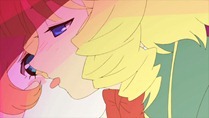 |
 |
The only thing that was predictable about this ending is that it wouldn’t be a predictable ending.
It would certainly be fair to say I have conflicted feelings over the way Kishi Seiji and Uezu Makoto decided to end Jinrui wa Suitai Shimashita. Make no mistake, it was a very good two-part arc – not among the best Jinrui has had to offer, but still better than 95% of the anime that aired this season. But it didn’t feel like a finale in any real sense (unsurprisingly, as it isn’t even the newest volume of the LN). It was just a two-part episode that ended the series, but it could as easily have landed anywhere in the cour and made as much (or as little sense) as it did where it is.
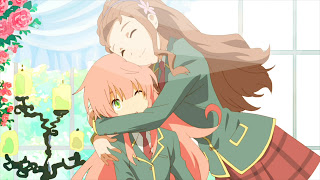 But then I step back, and I wonder – is that a fair criticism on my part? Jinrui has been relentlessly unconventional from the start, so why do I expect a conventional finale? This isn’t a traditional show in any way – it doesn’t have character development at all in the strictest sense, and each arc stands very much on its own. I can’t say how it all would have played if AIC had adapted the stories in the same order Tanaka-sensei wrote them – it would be a guess on my part. But I can say that even in the discontinuous style that Kishi and Uezu chose, there were still character elements that emerged that might have been better served if the chapters had been ordered differently.
But then I step back, and I wonder – is that a fair criticism on my part? Jinrui has been relentlessly unconventional from the start, so why do I expect a conventional finale? This isn’t a traditional show in any way – it doesn’t have character development at all in the strictest sense, and each arc stands very much on its own. I can’t say how it all would have played if AIC had adapted the stories in the same order Tanaka-sensei wrote them – it would be a guess on my part. But I can say that even in the discontinuous style that Kishi and Uezu chose, there were still character elements that emerged that might have been better served if the chapters had been ordered differently.
 Whatever its place in the larger superstructure of Jinrui, this finale was another brilliant example of the show’s relentlessly creative and somewhat disturbing worldview. I don’t think there’s any question that “The Fairies Tea Party” is the least fantastical and absurd of the series’ arcs. Heck, there are barely any Fairies in it (perhaps another reason it’s an odd choice to end with). It’s also, without question, the least funny of the arcs – and it makes very little attempt to be. Even more so than last week’s first part, this episode takes a very chilling and unsparing look at human nature – exaggerated for effect, perhaps, but generally grounded in realism – and in doing so, makes yet another comment about how “humanity has declined”, but from a completely different angle than any that has come before.
Whatever its place in the larger superstructure of Jinrui, this finale was another brilliant example of the show’s relentlessly creative and somewhat disturbing worldview. I don’t think there’s any question that “The Fairies Tea Party” is the least fantastical and absurd of the series’ arcs. Heck, there are barely any Fairies in it (perhaps another reason it’s an odd choice to end with). It’s also, without question, the least funny of the arcs – and it makes very little attempt to be. Even more so than last week’s first part, this episode takes a very chilling and unsparing look at human nature – exaggerated for effect, perhaps, but generally grounded in realism – and in doing so, makes yet another comment about how “humanity has declined”, but from a completely different angle than any that has come before.
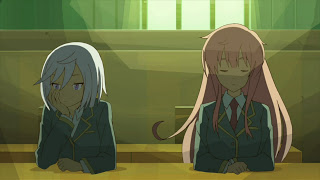 There are lots of things that we can take away from this “Tea Party”. First of all, Watashi is fiendishly clever and always was – in fact she’d figured out the riddle Y gave her on the day she arrived at school (based on Mother Goose’s “Solomon Grundy”, as creepy as most Mother Goose) but chose not to “solve” it because she didn’t like being part of Y’s game. She also used her deductive reasoning to figure out what Y was really all about. A list of missing books from the library, all of which involve man-boy or boy-boy love (titles like “Death in Venice” and Satyricon”). The RYOBO 230r running into the wall constantly because there was a secret room behind it. And a scathingly cutting analysis of Y’s personality – why she needed to call attention to her own cleverness and feel superior to everybody else.
There are lots of things that we can take away from this “Tea Party”. First of all, Watashi is fiendishly clever and always was – in fact she’d figured out the riddle Y gave her on the day she arrived at school (based on Mother Goose’s “Solomon Grundy”, as creepy as most Mother Goose) but chose not to “solve” it because she didn’t like being part of Y’s game. She also used her deductive reasoning to figure out what Y was really all about. A list of missing books from the library, all of which involve man-boy or boy-boy love (titles like “Death in Venice” and Satyricon”). The RYOBO 230r running into the wall constantly because there was a secret room behind it. And a scathingly cutting analysis of Y’s personality – why she needed to call attention to her own cleverness and feel superior to everybody else.
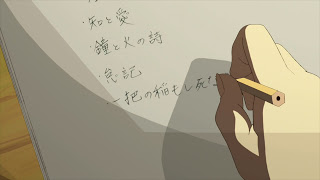 There’s a larger pattern that emerges here, that everyone has secrets, and everyone has unsavory elements of their character. This most certainly includes Watashi herself, who has a kind heart (we see this most tellingly with Joshu-kun) but is also snarky, sarcastic and anti-social. As a form of bribery to avoid having her secret spilled, Y – who’s called “Silver” by her former Wild Rose clubmates, who call Watashi “Sweets” (just like the Fairies do, interestingly) – takes Watashi on a magical mystery tour through a secret passage and shows her the dirty laundry of all the Wild Rose club members, and it’s not pretty. A categorical listing of every perceived slight ever received. Bitter and vicious complaining and gossiping about other girls. Hair samples preserved fetishistically in the pages of a diary (why did I hear “It puts the lotion in the basket” when I saw this?). And most chillingly, Curly – who always creeped the hell out of me, from the minute we saw her – who has a one-way conversation with her Watashi doll, before licking hot stew off its face and turning Norman Bates on it.
There’s a larger pattern that emerges here, that everyone has secrets, and everyone has unsavory elements of their character. This most certainly includes Watashi herself, who has a kind heart (we see this most tellingly with Joshu-kun) but is also snarky, sarcastic and anti-social. As a form of bribery to avoid having her secret spilled, Y – who’s called “Silver” by her former Wild Rose clubmates, who call Watashi “Sweets” (just like the Fairies do, interestingly) – takes Watashi on a magical mystery tour through a secret passage and shows her the dirty laundry of all the Wild Rose club members, and it’s not pretty. A categorical listing of every perceived slight ever received. Bitter and vicious complaining and gossiping about other girls. Hair samples preserved fetishistically in the pages of a diary (why did I hear “It puts the lotion in the basket” when I saw this?). And most chillingly, Curly – who always creeped the hell out of me, from the minute we saw her – who has a one-way conversation with her Watashi doll, before licking hot stew off its face and turning Norman Bates on it.
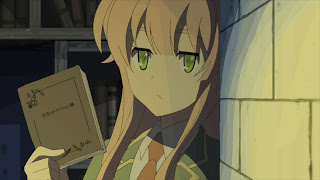 The weird thing is, I think the message here is “Let she who is without sin cast the first stone”. Y actually played her prank on Watashi because she was lonely, and saw someone of similar no BS intellect, and her BL fetish doesn’t actually hurt anybody. We saw last week that Watashi’s isolationism was really only hurting herself. Curly is desperately lonely. All of these people are flawed, yet they’re still people – and when they emerge from their lair they tuck their dark side away and treat each other mostly as friends. The choice in life is to either accept people as they are, warts and all, or be forever alone while you wait for the one person who can be exactly who you want them to be. The irony of course is that through unique circumstances Watashi actually did find such a person in Joshu-kun – but it was only because of her experience at the school and her relationship with Y especially that she was open to the experience.
The weird thing is, I think the message here is “Let she who is without sin cast the first stone”. Y actually played her prank on Watashi because she was lonely, and saw someone of similar no BS intellect, and her BL fetish doesn’t actually hurt anybody. We saw last week that Watashi’s isolationism was really only hurting herself. Curly is desperately lonely. All of these people are flawed, yet they’re still people – and when they emerge from their lair they tuck their dark side away and treat each other mostly as friends. The choice in life is to either accept people as they are, warts and all, or be forever alone while you wait for the one person who can be exactly who you want them to be. The irony of course is that through unique circumstances Watashi actually did find such a person in Joshu-kun – but it was only because of her experience at the school and her relationship with Y especially that she was open to the experience.
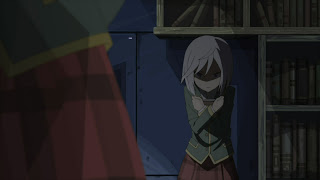 I think the meaning of the ending as regards the Fairy and Watashi’s memory is somewhat open to interpretation. The Fairies seem to inhabit some kind of strange space between waking and dreams, and the Fairy who had been Watashi’s first friend at the school turned out to have been by her side all along – riding along inside RYOBO, perhaps keeping the robot going long after its time on Earth should have ended. When he popped out and called her “Friend!” that perhaps represents as unapologetically sentimental as Jinrui has gotten, certainly since the “Time Management” arc.
I think the meaning of the ending as regards the Fairy and Watashi’s memory is somewhat open to interpretation. The Fairies seem to inhabit some kind of strange space between waking and dreams, and the Fairy who had been Watashi’s first friend at the school turned out to have been by her side all along – riding along inside RYOBO, perhaps keeping the robot going long after its time on Earth should have ended. When he popped out and called her “Friend!” that perhaps represents as unapologetically sentimental as Jinrui has gotten, certainly since the “Time Management” arc.
Series Impressions:
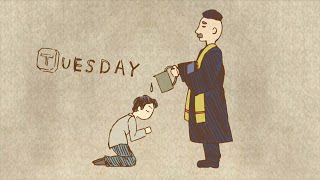 The short answer: love. Without a question this was the best of the Summer 2012 series in my view, and the gap was as wide as it has been in any recent season. Jinrui wa Suitai Shimashita is a rare sort of series that just doesn’t come along very often – something truly original and wildly entertaining at the same time. The novels of Tanaka Romeo have clearly been criminally underappreciated, but that’s starting to change. There’s a real buzz surrounding Jinrui, which has been rapidly climbing in the stalker rankings in anticipation of its 9/19 BD/DBD release of Volume 1 – there’s a chance it could sell quite decently (which would be a huge and pleasant surprise). The same creative team is also doing an adaptation of Aura, another Tanaka LN, in movie form.
The short answer: love. Without a question this was the best of the Summer 2012 series in my view, and the gap was as wide as it has been in any recent season. Jinrui wa Suitai Shimashita is a rare sort of series that just doesn’t come along very often – something truly original and wildly entertaining at the same time. The novels of Tanaka Romeo have clearly been criminally underappreciated, but that’s starting to change. There’s a real buzz surrounding Jinrui, which has been rapidly climbing in the stalker rankings in anticipation of its 9/19 BD/DBD release of Volume 1 – there’s a chance it could sell quite decently (which would be a huge and pleasant surprise). The same creative team is also doing an adaptation of Aura, another Tanaka LN, in movie form.
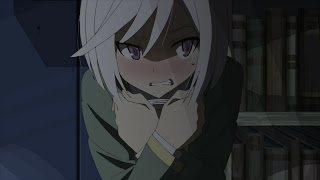 It’s interesting that the series chose to mention Mother Goose in the finale, because there’s a sort of shared mindset that didn’t really strike me until that happened – though in hindsight it should have been obvious. Besides quite literally being a “fairy tale” Jinrui has that some discordant combination of cute imagery and comedy with an extremely disturbing undertone. There’s an unsettling quality that runs through everything just as there is in “Goose” or Grimm” – a sense of whistling through the graveyard, if you like. The series paints a picture of a dying world, but at the same time manages to give us glimpses of the humanity that survives in the humans that survive – there are moments of warmth of honesty that transcend the black comedy and give the series a poignancy I wouldn’t have expected it to have after the hilarious premiere.
It’s interesting that the series chose to mention Mother Goose in the finale, because there’s a sort of shared mindset that didn’t really strike me until that happened – though in hindsight it should have been obvious. Besides quite literally being a “fairy tale” Jinrui has that some discordant combination of cute imagery and comedy with an extremely disturbing undertone. There’s an unsettling quality that runs through everything just as there is in “Goose” or Grimm” – a sense of whistling through the graveyard, if you like. The series paints a picture of a dying world, but at the same time manages to give us glimpses of the humanity that survives in the humans that survive – there are moments of warmth of honesty that transcend the black comedy and give the series a poignancy I wouldn’t have expected it to have after the hilarious premiere.
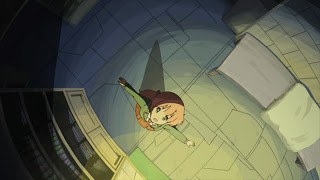 If I could have chosen an arc to end with, I would certainly have picked “The Fairies Time Management”, the origin story of Assistant-san (though it was only vol. 2 of the LN). That arc has the most feeling of a coda for me, because the relationship between Watashi and Joshu-kun was the most emotionally straightforward and least ironic element in the series. There was a real poetry to that story, and the ending had a real “ending” quality to it, even if was neither the last story chronologically in the anime or LN. It’s also a bit frustrating because after that episode, which framed Joshu-kun’s character so beautifully (interestingly, on his website Tanaka-sensei says Joshu-kun doesn’t speak so he “Doesn’t have to exchange words with people as dumb as a sack of hammers”), he effectively disappeared for the last four eps – which makes that development feel as if it was wasted just a bit. But as I mentioned earlier, that may be me trying to fit Jinrui into a conventional box it wasn’t designed to fit inside.
If I could have chosen an arc to end with, I would certainly have picked “The Fairies Time Management”, the origin story of Assistant-san (though it was only vol. 2 of the LN). That arc has the most feeling of a coda for me, because the relationship between Watashi and Joshu-kun was the most emotionally straightforward and least ironic element in the series. There was a real poetry to that story, and the ending had a real “ending” quality to it, even if was neither the last story chronologically in the anime or LN. It’s also a bit frustrating because after that episode, which framed Joshu-kun’s character so beautifully (interestingly, on his website Tanaka-sensei says Joshu-kun doesn’t speak so he “Doesn’t have to exchange words with people as dumb as a sack of hammers”), he effectively disappeared for the last four eps – which makes that development feel as if it was wasted just a bit. But as I mentioned earlier, that may be me trying to fit Jinrui into a conventional box it wasn’t designed to fit inside.
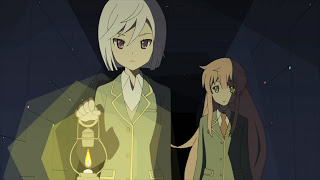 The list of things I love about Jinrui is a long one, starting with Nakahara Mai’s performance as Watashi – my current pick for best female seiyuu performance of 2012. When this series went for straight-out comedy it nailed it – Pan-tan the bleeding bread, “Chicken run”, the “time paradogs” pun at the end of episode 8. It also did satire better than any series in recent memory, with topics as wide-ranging as the manga industry, niche fandom, all the way to the rise of religion and its role in the rise and full of human culture itself. It also examined fascinating topics that anthropomorphism, through the example of “Pion and Oyage” the wayward space probed who longed to come home. And it gave us the Fairies themselves, one of the great literary creations of pop culture – so cute they could get away with saying almost anything, which they usually did.
The list of things I love about Jinrui is a long one, starting with Nakahara Mai’s performance as Watashi – my current pick for best female seiyuu performance of 2012. When this series went for straight-out comedy it nailed it – Pan-tan the bleeding bread, “Chicken run”, the “time paradogs” pun at the end of episode 8. It also did satire better than any series in recent memory, with topics as wide-ranging as the manga industry, niche fandom, all the way to the rise of religion and its role in the rise and full of human culture itself. It also examined fascinating topics that anthropomorphism, through the example of “Pion and Oyage” the wayward space probed who longed to come home. And it gave us the Fairies themselves, one of the great literary creations of pop culture – so cute they could get away with saying almost anything, which they usually did.
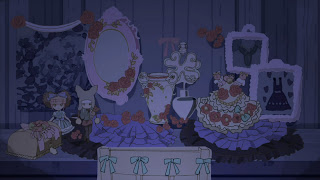 Will there be another season of Jinrui? If it were based just on sales it might actually be possible – which I never would have believed when the show started. However the anime has adapted considerably more than half of the LN series’ 7 volumes, so it seems unlikely there’s enough material to adapt into another season, at least for a while. As Tanaka continues the series we might just see a continuation of the anime in a couple of years – I certainly hope so, because it represents one of the creative high points of the medium in the last few years. Challenging, ruthless, and unapologetically intellectual, Jinrui refuses to fit neatly into any box or trope – it’s completely its own animal. I wish there were more shows like it, and it’s one of the best series of 2012.
Will there be another season of Jinrui? If it were based just on sales it might actually be possible – which I never would have believed when the show started. However the anime has adapted considerably more than half of the LN series’ 7 volumes, so it seems unlikely there’s enough material to adapt into another season, at least for a while. As Tanaka continues the series we might just see a continuation of the anime in a couple of years – I certainly hope so, because it represents one of the creative high points of the medium in the last few years. Challenging, ruthless, and unapologetically intellectual, Jinrui refuses to fit neatly into any box or trope – it’s completely its own animal. I wish there were more shows like it, and it’s one of the best series of 2012.
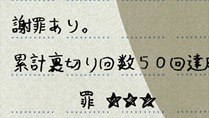 |
 |
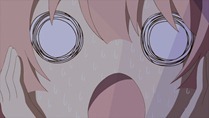 |
 |
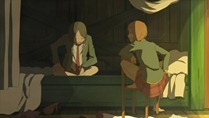 |
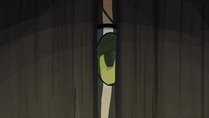 |
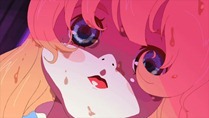 |
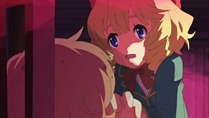 |
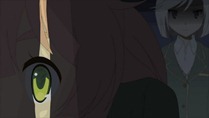 |
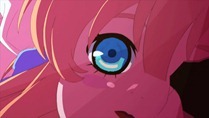 |
 |
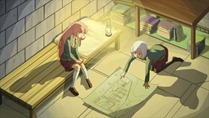 |
 |
 |
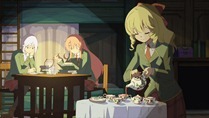 |
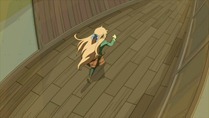 |
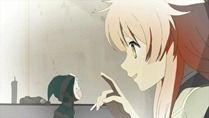 |
 |
 |
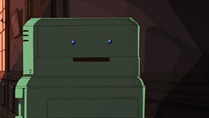 |
 |
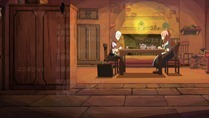 |
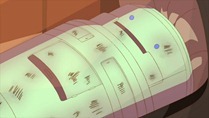 |
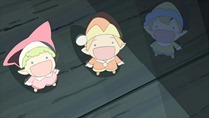 |
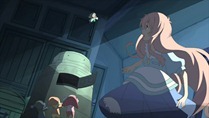 |
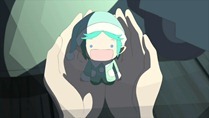 |
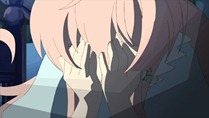 |
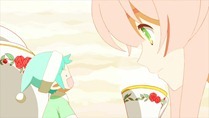 |
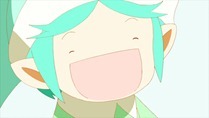 |
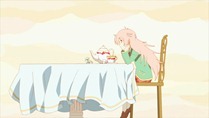 |



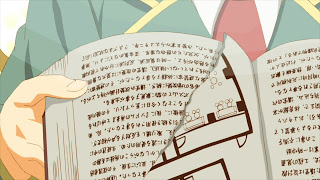


Anonymous
September 17, 2012 at 2:41 amI liked this series. I'm ok with the 2 parter they went with to end the season. I found the assistant arc to be kinda boring and would not have liked it to be the arc to finish the season. Here is hoping they make a season 2.
Beckett
September 17, 2012 at 3:16 amThe, as you put it, magical mystery tour was probably the highlight of the episode for me. So profoundly disturbing but at the same time Watashi's reaction to it all was so funny. Also, was this translated wrong or did Y seriously say that the hair collecting girls takes it out sometimes to TASTE it? Bleurg. Hopefully as soon as there is enough LN material we will get a second season. Not my favorite of the season maybe but top 3 for sure.
admin
September 17, 2012 at 4:12 amYeah, that was definitely the most striking sequence of the episode.
She said it, all right. But Curly was still scarier.
The Kenosha Kid
September 17, 2012 at 4:25 amI agree with a lot of what you said. However, some thoughts, in no particular order:
1) I love this show.
2) Why did they adapt out-of-order? I really don't understand that at all.
3) I may have been misreading your posts or something, but my overall outlook on the show is a lot darker than yours seems to be. But that might be a matter of different expectations on my part.
4) I don't feel like I can really say a lot about this show, as I've only seen it once, and haven't taken enough time to think and digest it. In this case, I'd say that's a very, very good thing to be able to say about it.
5) I don't know whether or not there'll be a second season, but I sure hope so. That said, if there isn't, I'm not going to complain particularly hard, as I think that what we've got is complete enough, or rather, that it would be against the spirit of the story to be traditionally complete.
6) I want a translation of the novels. Preferably, a good one.
7) You should read Cross†Channel. It is good. Incredibly good.
Litho
September 17, 2012 at 4:43 amI haven't seen this ep yet, but for what it's worth;
1) Same here. Best of the season.
2) Gives you an insight into her character and thought process. Later eps give you an idea on why she thinks the way she thinks in earlier ones. It's sort of a double-edge sword in some cases, but overall I thought it was done quite well. Than again, I'm a tad different from the usual anime-viewer (I think Haruhi is garbage), so it's probably not the same for everyone.
3) It seemed to be darker in the earlier episodes. In fact, the first 2 (headsplitting bread ftw!!) were the "darkest" in terms of satire (recall that conversation the faries had about extinction becoming a fad), imho. To be frank, I think the later eps weren't as strong on a satirical level, though there are other forms of "darkness" (human psyche et all) on display.
4) I agree.
5) Hoping for one too, or at least a few OVA episodes if, like Enzo says, there isn't much left to cover from the source material. Then again, ending it as it is seems fine as well, so props to the creator and production team.
6) I do wish more novels of this sort got translated.
7) No idea what that is, but I'll ask our friendly global spying agency (Google) about it later.
@ENZO
Thanks for covering this. Cheers
The Kenosha Kid
September 17, 2012 at 5:20 am2) I seriously hadn't thought of that, but I do like it.
7) A visual novel by Tanaka Romeo. Funny, disturbing, and sad. There's a certain point that I've seen many people admit to crying over. The ending is perfect.
It's even better than Jintai, if that says anything. And it shows a very similar sort of personality, though it's much lighter on the satire.
(Reposted and deleted and stuff. Sorry if this causes trouble of some sort.)
†Croos†
September 17, 2012 at 5:50 amArigato Enzo!
Enzo-san daisuki!
http://puu.sh/15VtF
Arabesque
September 17, 2012 at 6:14 amI think that series solidified it for me.
I am a Kishi Seiji fan.
Wonderful series. This and Hyouka ended up being the two finales that got me emotionally moved in a way I didn't expect.
Bravo.
admin
September 17, 2012 at 6:54 amWow, so much thanking! You're welcome – it was a blast to cover Jinrui.
dv
September 17, 2012 at 9:15 amWhy adapted out of order? To be not chronological. To point to the point that this show is character driven not plot driven. In fact it is Watashi Driven. And character development has no meaning in this show. That is why being out of order helps to show this.
The real reason why humanity is in decline? Cause the majority of the girls aint interested in guys.
1. Murderer in the making
2. Loves hair, girls hair
3. getting drunk
4. Loves onee-san
5. Prefers maleXmale relationships
Humanity is doom without normal females!!
SQA
September 17, 2012 at 10:21 amThe more I've thought on it, I think this was a pretty solid way to end the series. While there was an amazing amount of dark comedy and satire in the series, there was still a core of sentimentality to most of the stories. Or at least a lack of actual malice involved (the Fairies aren't Evil, just scary as all hell). This arc wraps up those concepts to finish off the series. It also works as a capstone to understanding Watashi and her relationship with the Fairies. Clarification and edification to end a series with a lot of heart to it.
That and ending the series on "paradogs" would have been just too much. 🙂
Eternia
September 17, 2012 at 2:01 pmCurly is batshit crazy lol!
I think it's a good way to end this anime, with Watashi having a drink with her very first fairy friend. It's also really nice to see these girls are still friends until the graduation day, even though Watashi found out their real faces. The author is telling me, "That's how you make friends."
I love this series! It teaches me lessons in life, and leaves impression in my heart. It's really meaningful compared to normal (cliche) story, who's either endless battles and power-ups, good guys always win, friendship and love solve everything, overdramatic romance, swarm and swarm of harems, the list goes on.
Guratan
September 18, 2012 at 5:33 amWhat I interpreted from the novel:
The faries have a power to hide in someone's subconsciousness, which in return causes the person to forget everything about them (interestingly called annihilation, as in particle physics). Like Watashi forgot about the green fairy after he magically disappeared in episode 11. In this state, the person may receive the good luck emitted by fairies thus become happy-go-lucky (ultimately resulting in humanity's decline; desperation is essentially what drives us to progress, I guess).
Watashi had been in the state of "1f" all this time, even when the faries fled out the village in episode 5-6. The first green fairy had always been in Watashi's head, giving her the best he could with 1f power. I find that quite touching because those fairies are normally interested only in seeking their own fun.
itsmeMARIO
September 19, 2012 at 2:56 pmThanks for this! Very interesting… I'll have to keep this in mind the next time i watch this show.
Kunagisa
September 18, 2012 at 11:27 pmThanks for blogging this series. I can't say I followed the blog every episode, but the ones I did tune it were enjoyable reads. I highly doubt there's another season of Jinrui regardless of sales. It's nice that you mentioned Aura, which has received almost no attention on this side of the globe. When KyoAni's chuunibyou was announced, people said the novel's a rip off of Aura (at least among the light novel readers), it'll be interesting to see how the team handles it.
Thanks again and see you in Shinsekai's entries.
PS: I'm probably the only one who's overly depressed by the ending.
admin
September 19, 2012 at 12:01 amDepressed? I'd love to hear more.
You're welcome, and thanks for the thanks. You never know – 2 or three LN volumes later, it might just happen.
pchu
September 19, 2012 at 11:20 pmActually the plot in the anime is a bit different with that of the original light novel, such that the anime has different but self-consistent implications on several things, e.g. what exactly is the fairies' secret tea party, and where did the green hide during all these years. Comparing the anime and the LN, I prefer the latter one, because it's still "unconventional" (in some sense) and tricky (like all those previous episodes).
I wrote an article to explain some plots that did not appear in the anime and the implications behind the whole work (this volume of LN). But it's written in Chinese… Nevertheless, I'll try to make it short (if I can).
Before Watashi recalled her past, she've had strange feelings "deep inside her ears", making sounds like "scratching on papers". And one day, she found that the fairies living in her room all "set out to travel", but they "didn't know the destination".
Then Watashi started recalling her past "in the silence left behind". The plot goes on like in the anime. Watashi had suffered enough and said, "I don't want to be alone", while the green responded, "That's simple". Then Watashi forgot the green.
The time when Watashi recalled the green, she was in a room with out-of-order robots. "Humans won't do this. Here's just like a graveyard" she thought, then remembered herself meeting the green. But yet the red-hair boy didn't remember.
Before Watashi graduated, the last time she helped RYOBO turning to the right direction, she invited RYOBO (as a friend of her) to her home. Hearing the word "friend", RYOBO's light "blinked irregularly, like a living thing". "Do you have friends after that?" it asked. "What did you say?" Watashi was surprised. "May the bless of fairies always be with you." it continued, but then repeated again the regular phrases, "I'm RYOBO 230r, a robot assist…" Watashi thought that she misheard it, but still said, "If you find the fairies, please don't dispose them, for they're not foreign objects." RYOBO's light blinked again, "yes, I understand."
Then Watashi woke up, and heard again "paper scratching" sounds deep inside the ears. After Y brought her the inoperative RYOBO and Watashi tried to repair it, she heard again that sound. Then lots of fairies popped out from her ears, saying "We're back" or "It's a nice travel". While Watashi was still confused, the fairies explained, "So long as someone's there, we can go visit him". "So long as someone's there?" Watashi asked. "(Even) so long as, only one person's there," they answered. Suddenly something "flashed through her mind", something she could not tell, but she decided not to make it clear, for an amazing comprehension.
Then the fairies found the inoperative RYOBO, and said, "Dejavu?", "Already seen at the travel destination", "It's a real object". When Watashi asked if they can repair it, they answered yes for repairing but that its "soul" had already gone.
Watashi thought to herself, "The hidden rooms and the robot's strange behaviour are suddenly connected. Who did the lonely robot meet in the hidden passageways?" Again there was the "paper scratching" sound, but from RYOBO's side. She disassembled the outer shell of RYOBO, and found lots of fairies popping out of it. One fairy jumped out of the window, saying "mission complete". Some jumped into mouse holes. Some jumped into holes on the floor. All ran away; nobody left.
pchu
September 19, 2012 at 11:22 pm(continuing)
Watashi then suspected that "they probably had the tea party held in the heads". That night she had a dream, in which she was still a child, and came to the tea party of the green. She thought that the green was always by her side. When the green asked her "Still feel lonely?", Watashi answered "No. I've always got the feeling that a tea party is being held in my head".
Then she thought: (narration)
So long as someone's there, some other people will come.
So long as the tea party is being held, guests will surely come.
People going back and forth, just like the communication.
The principle is the same.
In the sense that the movable things help to connect the different minds.
So I understood.
So long as the fairies are there.
Right, so long as they stay in the gap of memories.
No matter who can get to know each other.
At last, Watashi asked the green "Don't you feel lonely?". He answered, "(No,) because lots of guests!" She agreed while thinking, "Right, when I meet different sorts of things, they surely—" And she can no longer remember clearly.
Right… now some points to conclude (that may differ from the anime):
1. RYOBOs clearly have personalities (just like PIONeer and vOYAGEr). They're even friends of fairies. Thus fairies "bury" them in the "graveyard" after their "souls" are gone.
2. The fairies originated in Watashi's room travelled into her recollections, so as to pay a visit to the green (who resides in the gap of Watashi's memories)
3. Fairies can hide in the gap of memories.
3.1. If RYOBO has a soul, it might also have fairies in its memories. This can explain why lots of fairies popped out.
3.2. Saying "the green hid in the gap of memories" means for two things: (a)Watashi forgot the green (when then green decided to fulfill her wish) and (b)it suggests the potential possibility to be rediscovered.
3.3. But in many cases (such as for the red-hair boy), fairies "in the gap of memories" (of childhood) weren't rediscovered. Actually, Tanaka Romeo dedicated a section for this in the end:
Fairy Notes [annihilation]:
[…]means particles and anti-particles blablabla…
[…]but fairies can disappear from legends or myths. That's annihilation.
Memories are considered as a sort of myths.
Thus this suggests that fairies can hide in people's consciousness.
Human beings can hardly recall a particular fairy disappeared in the deep memory.
Like recalling the fairy tales we heard in our childhood, we only have ambiguous and vague impressions.
Maybe legends and myths are results of the accumulations of this phenomenon.
pchu
September 19, 2012 at 11:23 pm(continuing)
3.4. Disappeared fairies seem to be a metaphor of faded memories. If the "secret tea party of fairies" is held "in the gap of memories", then it's also something ambiguous, between "remembered" and "forgotten", between the facts and the legends or myths. In this way the tea party is "secret", so nobody can find it. Memories ARE something ambiguous, c.f. Fairies' Time Management, Watashi said to Grandfather
3.5. With this understanding, "searching for the secret tea party of fairies" is equivalent to "searching for the faded memories". A la recherche du temps perdu, huh? I really appreciate Romeo's concretizing a "search" (of memories) into a "search" (of a secret party).
4. Why did the green answer "because lots of guests"? Just look at the line after: "Right, when I meet different sorts of things, they surely—" —become my memories. The "guests" of the green can mean either new people, things or knowledge!
5. When Watashi said "I've always got the feeling that a tea party is being held in my head", I suspect that subconsciously she welcomes whoever or whatever comes to her. Something like the curiosity? Saying "fairies' tea party disappears in the depth of memories" could mean "curiosity (of someone) progressively disappears (while growing up)"??
Still unconventional and tricky, huh?
itsmeMARIO
September 20, 2012 at 3:43 pmThanks for the interesting post! I read it all 😉
Lotor IV
October 1, 2012 at 3:11 amI agree with the first comment that the Assistant arc was kind of repetitive and took too long to get its point across. Conversely I enjoyed this Final arc and the Fairy Country arcs lot more.
Mr. Braun
August 6, 2017 at 1:51 pmHello! I know I’m late to the part, and I don’t know if this qualifies as spoiler (I guess if you want to read the light novels), but here’s an interesting piece on Reddit…
(Note: If you ever do plan to read the novels this is a massive spoiler, so read at your own risk – Enzo)
.
.
.
.
.
.
.
.
.
.
.
.
.
.
.
.
“MAJOR SPOILER AHEAD:
Joshu-san, the assistant, is the last remaining member of the humanity.
Watashi (‘I’), the protagonist and the narrator of the series, was a sleeper Yosei-san (fairy). Along with every single person that appeared in the series.
This is why nobody has a name. Grandfather is Grandfather, the protagonist is ‘Watashi’, and Joshu-san is Joshu-san. His real name is Joshua Courtney (Kotoni).
This is also the reason why nobody in the series can communicate with Joshu-san. Yosei-san have trouble communicating with humans. This is noted throughout the series.
Yosei-san missed the humanity and sought to mimic what they remembered of the people, which resulted in what we see in Humanity Has Declined.
In the end Watashi remembers that she, too, is a Yosei-san and finally is able to communicate with Joshu-san for the first time.
As the title says, humanity has indeed declined to one.”